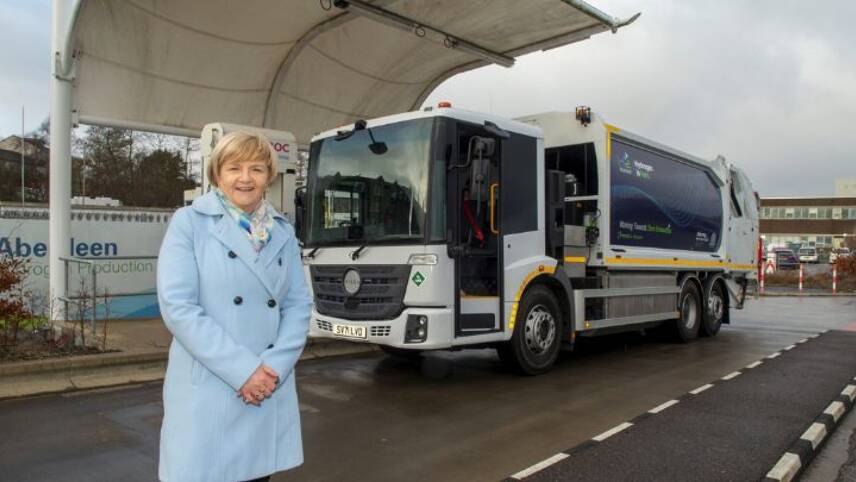Register for free and continue reading
Join our growing army of changemakers and get unlimited access to our premium content

Pictured: Aberdeen City Council Leader
Dual-fuel bin lorries, powered by diesel and hydrogen, had already been introduced in Fife and Oxford, but this truck is touted as the first of its kind in the UK.
The truck, manufactured by fuel cell producer Hyzon Motors and refuse collection vehicle manufacturer Geesinkorba, will enter operations in early March. The City Council is expecting that its journeys will enable emissions reductions of 25 kilograms of CO2e per litre of fuel used, compared to diesel trucks using the same routes.
Only green hydrogen – produced from water using electrolysis facilities powered by renewable electricity – will be used to refuel the truck. While hydrogen produces no greenhouse gas emissions at the point of combustion, it can be high-carbon across the lifecycle if grey (fossil-fuel-based) or blue (gas-based with carbon capture) methods of production are used.
Aberdeen City Council already hosts hydrogen refuelling infrastructure that provides green hydrogen, as part of a project with BP. In October 2020, the local authority began trialling hydrogen-powered double-decker buses and has since worked with First Group to permanently roll them out. Aberdeen now plays host to 85 hydrogen-powered vehicles across the private and public sectors, the Council Claims.
The Council’s lead for city growth and resources, Cllr Ryan Houghton, said the launch of the hydrogen bin lorry is “an important step forward” in the city-region’s “hydrogen journey”.
“Our work has been ground-breaking and the people of Aberdeen can be proud that our city is proving to be a catalyst for demonstrating how public sector fleet can be decarbonised, setting an example for other regions in the UK and beyond,” Houghton said.
He highlighted the fact that the bin lorry launch comes shortly after the Council announced a joint venture with BP to produce a green hydrogen production and refuelling facility known as the ‘Aberdeen Hydrogen Hub’.
The Hub will be delivered in three phases and will, in the first instance, supply green hydrogen to public and private-sector vehicles. It will then be expanded to produce green hydrogen for the rail and maritime sector. In time, a third phase will provide hydrogen for heating and for exporting.
Solar power will initially be used to support hydrogen production at the Hub but, for the third phase to reach its full scale, connections to offshore wind farms will likely be necessary, the Council has stated.
Hydrogen hubs
Given that the UK’s Hydrogen Strategy targets 5GW of low-carbon hydrogen production across Britain by 2030, several other locations are planning production and distribution facilities.
In Scotland, green hydrogen hub plans are in the pipeline for the Port of Cromarty Firth, Orkney and the Whitelee onshore wind farm near Glasgow, operated by SSE. Glasgow City Council, like Aberdeen City Council, already has plans to implement hydrogen waste collection vehicles.
As for England, BP is proposing a blue hydrogen production hub in Teesside, while Trafford Green Hydrogen subsidiary Carlton Power is planning an industrial-scale facility in Carrington. There are also plans to build a green hydrogen hub to serve the Port of Shoreham in West Sussex.
Sarah George


Please login or Register to leave a comment.